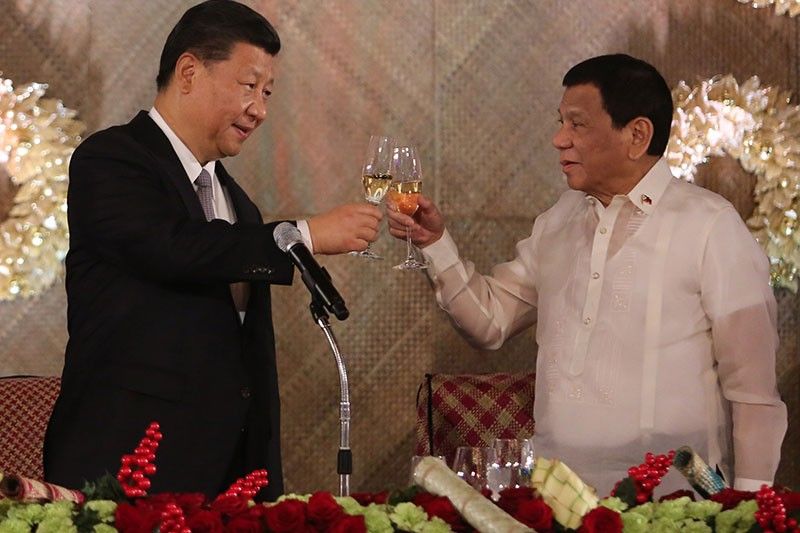Commentary: China’s two-pronged games against Philippines

The COVID-19 pandemic is causing deaths in more than 180 countries around the world.
Amid this backdrop, China is vigorously implementing two-pronged games aimed at achieving its foreign policy goals. On the one hand, it is conducting medical diplomacy with several countries preoccupied with addressing the spread of the COVID-19 global contagion, which began in China in December 2019.
On the other hand, China is taking advantage of the world’s preoccupation with the COVID-19 pandemic to pursue its maritime expansion in the South China Sea.
In these disputed waters, China’s Coast Guard’s (CCG), People’s Liberation Army’s Navy’s (PLAN), and People’s Armed Militia’s vessels are intimidating other claimant states’ naval vessels and fishing boats, and buttressing its territorial claims by creating new administrative units.
In this respect, China isn’t letting a grave crisis go to waste as it is taking advantage of the dire situation to pursue its foreign policy goal of maritime expansion more aggressively.
China’s medical diplomacy
In conducting its medical diplomacy to the Philippines, the Chinese official line states that China and the Philippines are “friendly” neighbors across the sea, and both countries have long and excellent tradition of assisting each other in times of calamity.
China’s medical diplomacy to the country entails: a) donating medical equipment; b) assisting the Philippines in purchasing and in transporting badly needed medical supplies; and c) sending a team of medical experts to provide technical assistance to the Philippines in addressing the COVID-19 pandemic.
In early April, the Chinese government airlifted three batches of medical supplies that included 102,000 test kits, 400,000 surgical masks, 40,000 medical N95 masks, 20,000 assorted PPEs and 30 ventilators.
The Philippines also received donations of medical supplies and PPEs from provincial and city governments and private donors.
China also assisted the Philippines in purchasing nearly 10,000 cubic meters of anti-epidemic supplies and medicines. China also opened “an air life channel” to facilitate the transfer of medical supplies the Philippine government purchased from private Chinese companies to the Philippines in view of the suspension of commercial flights between the two countries.
Finally, China sent a team of 10 medical professionals and two officials to assist the Philippine government in managing the COVD-19 pandemic.
This team was tasked to share to the Philippine government technical advice on the prevention and control of the infectious disease in the country. During the team’s stay in the country, the Chinese medical experts visited various local health facilities to examine how the Philippines is controlling the spread of the pandemic, which began in Wuhan, China.
Business as usual in the South China Sea
The United States and Japan are currently distracted by their efforts to prevent the spread of the COVID-19 pandemic in their respective societies. With these two external powers distracted, China is actively pressing its territorial claims in the South China Sea.
In early April, China started the operations of two maritime research stations in two artificial islands that are claimed by the Philippines: Fiery Cross (Kagitingan) and Subi (Zamora) Reefs in the Spratly Islands.
On April 18, the State Council of the city of Sansha announced the establishment of two new districts to administer the disputed waters in the South China Sea. They are: Xisha District to administer Xisha (Paracel) and Zhongsha islands; and Nansha District that has jurisdiction over the Nansha Islands (Spratlys).
This is move is again part of China’s gambit to demonstrate its assertiveness in the disputed waters while other claimant states are preoccupied with addressing the coronavirus pandemic.
On April 22, the Philippine Department of Foreign Affairs filed two diplomatic protests against China, accusing it of violating international law and Philippine sovereignty.
According to Philippine Foreign Affairs Secretary Teodoro Locsin Jr., the DFA sent the Chinese Embassy in Manila two diplomatic notes: a) On the February 17 incident in the South China Sea that involved a Chinese warship directing its Gun Control Director (GCD) to the Philippine Navy’s (PN) anti-submarine corvette the BRP (Barko ng Pilipinas or Ship of the Republic of the Philippines) Conrado Yap in the Spratlys; and b) China’s declaration of portions of a Philippine territory as parts of Hainan province.
The February 17 PN-PLAN standoff is the more serious between the two incidents because this could have led to the use of force by either parties that could escalate into a major armed conflict in the South China Sea.
A ranking Philippine military commander described the PLAN’s action as hostile and an encroachment in the Philippines’ Exclusive Economic Zone (EEZ). A noted Manila-based defense analysis observed the incident as unacceptable in common military practice because “it is a hostile act that can lead to miscalculation, and then to escalation, ultimately, conflict.”
China’s two-pronged games with the Philippines
China is playing this two-pronged diplomatic game with the Philippines. Alongside medical diplomacy, China is also not allowing the pandemic to get in the way of its goal of wearing down other claimant states in the South China Sea.
China is using the PLAN, CCG and maritime militia, along with legal warfare, against Malaysia, Vietnam, and the Philippines so that they will: a) abandon their respective maritime claims in the South China Sea; and b) accept whatever deal Beijing is putting on the table in resolving their respective maritime rows with China.
Renato de Castro is trustee and convenor of the National Security and East Asian Affairs Program of think tank Stratbase ADR Institute.
- Latest





























